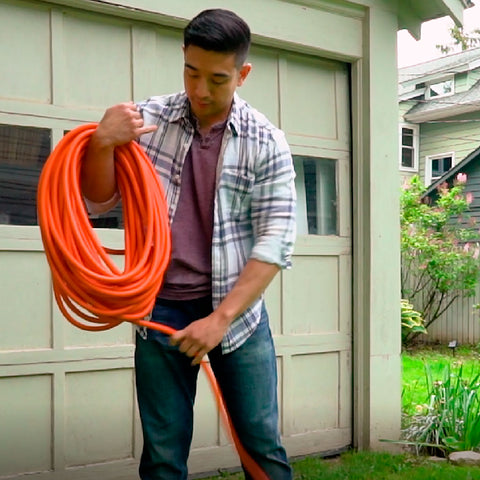
Extension cords have a lot of purposes for outdoor use, whether it be to power up a lawnmower or to keep your food and drinks cold at a summer party. But climate is unpredictable, and when the sun is shining bright, it could start showering five minutes later. Is it safe to continue using your extension cord if it starts to rain?
Firstly, yes, it is, given that the proper extension cord is used. Many extension cords are designed for resistance to rough terrain, abrasion, and weather, but not all cords are created the same.
In this blog post, we'll recommend which type of extension cord you should be using in wet weather conditions. We'll also cover some of the hazards associated with using cords in the rain and offer some tips for staying safe. Finally, we will discuss the proper way to use an extension cord in wet weather.
Which Type of Extension Cord Should You Use in Rain or Storm?
When using an extension cord in wet weather, it's important to use the right type of cord. The three types of extension cords are:
1. Waterproof (for outdoor use only)
2. Indoor/outdoor
3. General-purpose (!! not for outdoor use !!)
Here is the breakdown of each type of extension cord and how it will function in wet climates:
1. Waterproof Extension Cord
The best type of extension cord to use in wet weather is a waterproof cord. These cords are designed for outdoor use and are resistant to water damage. They come with a rainproof jacket that will keep the connectors and plugs dry. Since they are specialized cords, they are the most costly.
2. Indoor/Outdoor Extension Cord
If you don't have a waterproof extension cord, you can use an indoor/outdoor extension cord instead. This is the type of cable you will find in the LifeSupplyUSA Extension Cords Catalog. These cords are designed for both indoor and outdoor use, and they are also resistant to water damage.
Check if the cord has a letter rating (i.e. W, S, T) to indicate how well it resists water damage. The weather-resistant rating will be either W (for water-resistant) or T (for weather-tight). LifeSupplyUSA Indoor/Outdoor extension cords are rated SJTW.
3. General Purpose Extension Cord
Do not ever use this type of cord outdoors in wet weather. This cord is not designed to be used outside.
Hazards Associated with Using Extension Cords in Wet Weather

There are several hazards associated with using extension cords in wet weather. Once you confirm you are using an extension cord designed for outdoor use, the next step is to confirm it is ready for use. Before you ever take an extension cord outside, you need to inspect it for damage.
Keep an eye out for tears or soft spots on the cable jacket. Although it's completely fine to get water on the jacket, it's the wiring on the inside of the jacket you want to protect. So, if inside wiring may have been exposed, do not risk exposing it to water. Check for the following damages:
1. Tears or cuts in the cable jacket
2. Loose or exposed plug ends
If you notice any of these damages, do not use the extension cord. Contact a professional electrician for advice, or completely replace the cord. If a damaged extension cable is used in the rain, you risk serious injury or death from electrocution, fire, or carbon monoxide poisoning.
Proper Use of Extension Cord in Wet Weather
Extension cords should only be used outdoors in wet weather if they are specifically designed for this purpose. All-purpose extension cords should never be used outside, as they are not water-resistant and can easily short out.
When using an extension cord in wet weather, make sure that the connectors and plugs are waterproof. The plug on the cord should also be covered with a rainproof cap.
During Use
It's important to keep the cord away from sources of water, such as gutters, downspouts, and storm drain. If the cord does come into contact with water, it can easily short out and cause a fire.
When using an extension cord in wet weather, be sure to:
- Keep the cord away from sources of water.
- Plug the cord into a GFCI outlet.
- Make sure the appliance is off before unplugging the cable.

After Use
After you have used an extension cord in the rain, there are several precautions you should be aware of before using the cord again. Make sure to:
1. Allow the cord to dry completely before using it again.
2. Inspect the cord for damage that may have occurred during use.
If you find any damage, do not use the cord and contact a professional electrician. Damaged cords can easily cause electrical shock or fire.
Extension Cords in the Rain: Is It Safe to Use Them?
When using an extension cord in wet weather, it's important to take precautions to stay safe. Follow the tips listed above and always use a waterproof extension cord when working outdoors in the rain. Stay safe and dry while using your extension cords!
Remember that at the LifeSupplyUSA store, you can find multi-purpose extension cords that are designed to perform in the rain; they are durable, heavy-duty cables that are resistant to moisture, oil, and abrasion, making them an excellent choice to have readily accessible.








